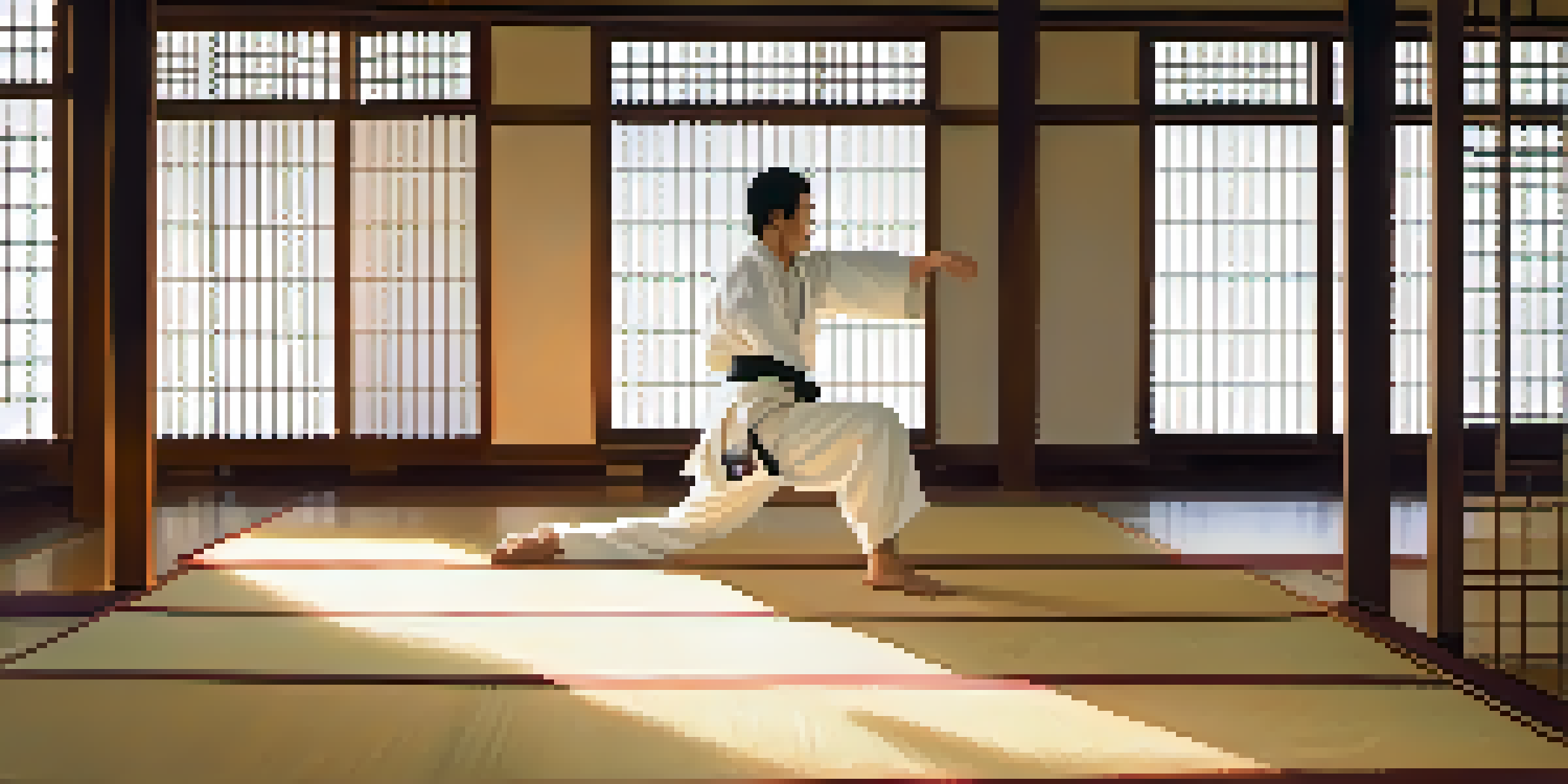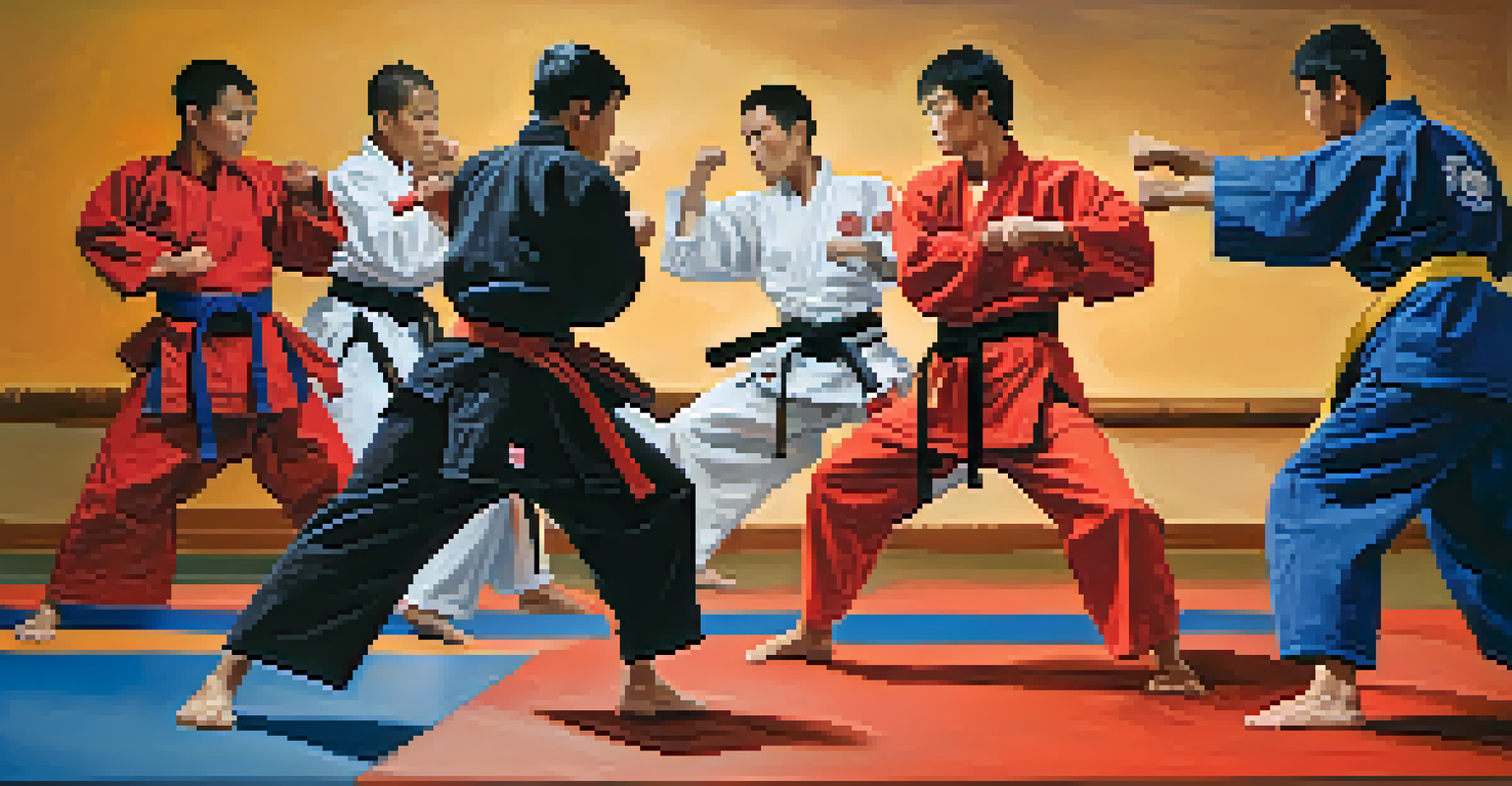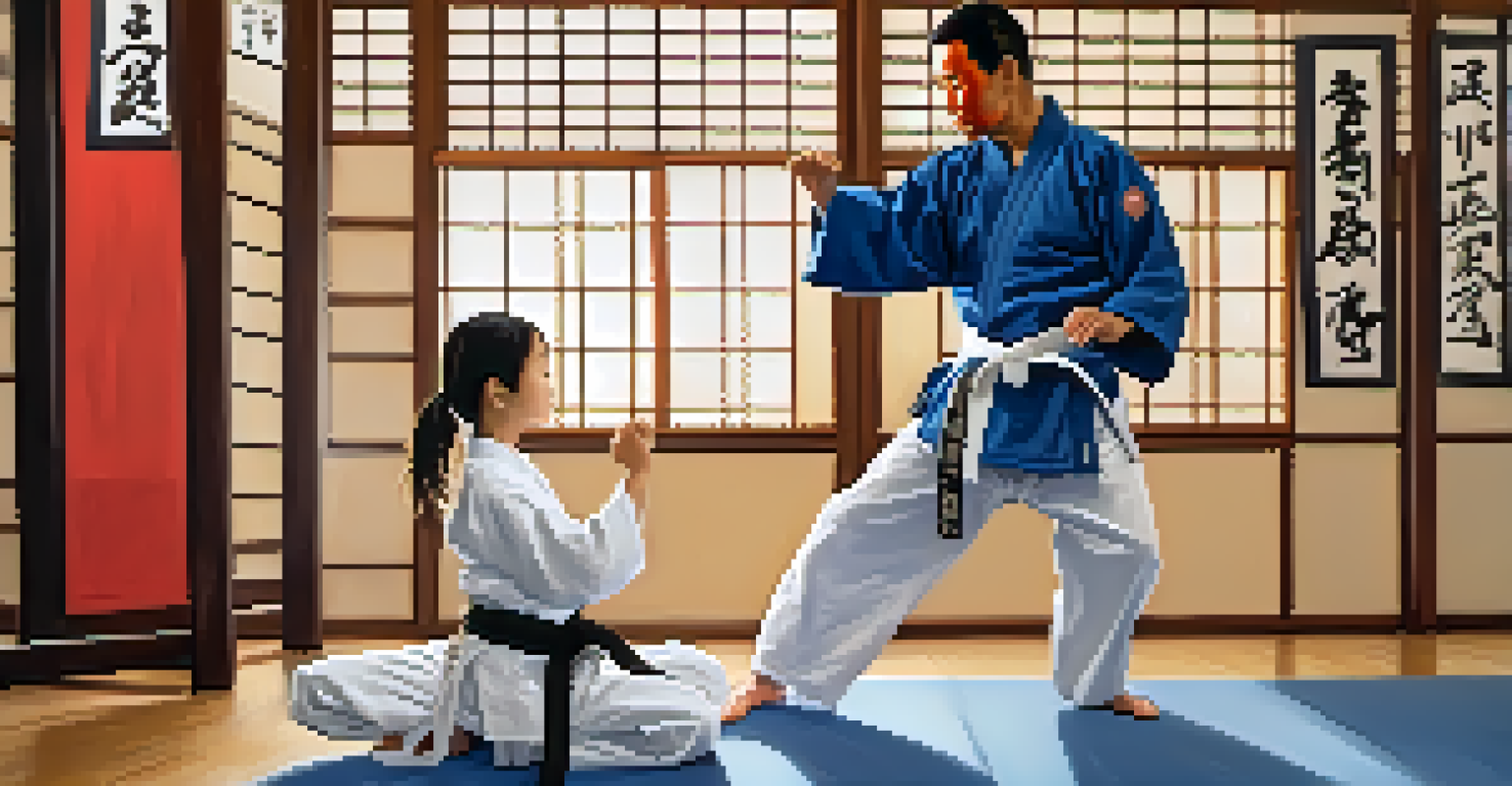The Role of Discipline in Martial Arts for Mental Health

Understanding the Connection Between Discipline and Mental Health
Discipline is a cornerstone of martial arts, shaping not just physical skills but also mental resilience. When practitioners commit to regular training, they cultivate a sense of responsibility and focus. This commitment translates to improved mental health, as the structure provided by martial arts often brings clarity and purpose to daily life.
Discipline is the bridge between goals and accomplishment.
Many people experience stress and anxiety, which can feel overwhelming. Engaging in martial arts creates a disciplined environment where individuals can redirect that energy into focused practice. This shift not only alleviates stress but also fosters a greater sense of control over one's emotions and thoughts.
Additionally, the discipline learned in martial arts can help develop coping mechanisms for life's challenges. Just as each kick and punch requires precision and patience, so too does managing mental health. By honing these skills on the mat, practitioners often find themselves better equipped to handle external pressures.
Building Self-Discipline Through Martial Arts Training
Self-discipline is often seen as a vital skill for success in any field, and martial arts training offers a unique way to cultivate this trait. Each session requires commitment, whether it's showing up for classes or pushing through challenging drills. This consistent practice builds a strong foundation of self-discipline that can overflow into other areas of life.

For example, a student who learns to maintain focus during a long sparring session may find it easier to concentrate on work or studies later. This connection highlights how the lessons learned in martial arts extend beyond the dojo, influencing personal and professional growth. Over time, the ability to set goals and achieve them becomes second nature.
Discipline Boosts Mental Health
Regular martial arts training fosters mental resilience and provides a structured environment that enhances clarity and emotional control.
Moreover, the journey of mastering martial arts is filled with challenges and setbacks. Practitioners learn that discipline is not just about consistency but also about resilience. This understanding reinforces their mental fortitude, allowing them to face difficulties in life with a more grounded approach.
The Role of Routine in Enhancing Mental Well-Being
Establishing a routine is essential for mental health, and martial arts provide a structured environment to do just that. Regular training creates a rhythm that can ground individuals, offering relief from the chaos of everyday life. This predictability can be especially beneficial for those struggling with anxiety or uncertainty.
Martial arts is not about fighting; it's about building a disciplined mind.
Moreover, routines in martial arts often involve rituals, such as bowing to instructors and practicing specific katas. These rituals foster a sense of belonging and tradition, which can enhance community ties. Feeling connected to others during training can also alleviate feelings of loneliness or isolation.
As practitioners engage in these routines, they develop a deeper understanding of themselves and their capabilities. This self-awareness is crucial for mental health, as it allows individuals to recognize their triggers and respond to them more effectively. The journey of martial arts becomes a pathway to personal discovery and growth.
Enhancing Focus and Concentration Through Martial Arts
Focus and concentration are vital skills that martial arts training helps to develop. During classes, practitioners must remain present, concentrating on their movements and techniques. This level of focus can be a refreshing break from the distractions of modern life, providing a mental reset.
As students work on their skills, they learn to block out external distractions and hone in on their goals. This practice not only enhances their martial arts performance but also transfers to everyday tasks. Tasks that once felt overwhelming become manageable as concentration improves.
Routines Enhance Well-Being
Establishing a training routine in martial arts creates predictability, which can alleviate anxiety and promote a sense of belonging.
Additionally, the ability to focus on the present moment is a form of mindfulness, which is increasingly recognized for its mental health benefits. Practicing mindfulness through martial arts can reduce symptoms of anxiety and depression, offering a holistic approach to mental well-being. In this way, martial arts serves as a dual-purpose tool for both physical and mental fitness.
Boosting Confidence and Self-Esteem Through Discipline
Engaging in martial arts can significantly boost confidence and self-esteem. As practitioners progress and achieve new skills, they experience a sense of accomplishment that reinforces their self-worth. This growth is often accompanied by the discipline required to reach those milestones.
For many, the journey of learning martial arts involves overcoming fears and insecurities, which can be transformative. Each belt earned or sparring match won serves as a tangible reminder of their capabilities. This newfound confidence often spills over into other aspects of life, empowering individuals to tackle challenges with a more positive outlook.
Furthermore, the supportive community found in martial arts schools fosters encouragement and camaraderie, creating an environment where individuals feel valued. This sense of belonging can amplify self-esteem, helping practitioners recognize their worth beyond their martial arts achievements.
Martial Arts as a Tool for Stress Relief and Emotional Regulation
Martial arts offer a powerful outlet for stress relief, allowing practitioners to channel their frustrations into physical activity. The rigorous workouts can release endorphins, the body's natural mood lifters, which help combat feelings of stress and anxiety. This physical exertion can feel therapeutic, providing a necessary escape from daily pressures.
In addition to physical stress relief, martial arts training teaches emotional regulation techniques. Practitioners learn to control their breathing and reactions during sparring, which translates to better emotional responses in everyday situations. The ability to remain calm under pressure is a skill that can significantly impact mental health.
Community Supports Mental Health
The relationships formed in martial arts schools offer emotional support and foster a sense of connection, crucial for those facing mental health challenges.
Moreover, the focus on discipline encourages individuals to process emotions rather than suppress them. Whether it's through meditation or reflection after a training session, martial arts provide a space for self-exploration and emotional healing. This holistic approach nurtures mental well-being, fostering a deeper understanding of oneself.
Community Support and Connection in Martial Arts
One of the often-overlooked benefits of martial arts is the community it creates. From training partners to instructors, the relationships built in martial arts schools can provide significant emotional support. This sense of community can alleviate feelings of isolation, especially for those struggling with mental health issues.
Engaging with others who share similar interests fosters a sense of belonging and purpose. Group classes and team sparring sessions encourage camaraderie, allowing individuals to connect over shared goals and experiences. These connections can be a lifeline for many, offering encouragement and motivation.

Additionally, many martial arts schools prioritize mental health awareness, providing resources and support for students. This proactive approach creates an environment where mental well-being is valued, reinforcing the idea that seeking help is a sign of strength. In this way, martial arts become not just a physical practice but a supportive network for mental health.